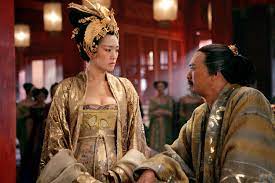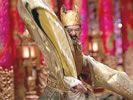Eye For Film >> Movies >> Curse Of The Golden Flower (2006) Film Review
Curse Of The Golden Flower
Reviewed by: Max Crawford

Zhang Yimou's latest opus is Shakespearian, dynastic tragedy on an operatic scale. With Curse Of The Golden Flower, Zhang plots a straightforward course through a somewhat convoluted tale, allowing the audience to easily follow events as they unfold. The story, at its simplest, is one of power gaming and betrayal, but it is interwoven with enough plotting, poisoning, incest and intrigue that a lesser director could easily have got hopelessly lost.
Set during China's Tang Dynasty, almost entirely within the Imperial Palace, the film charts the downfall of the family of Emperor Ping, as it tears itself apart in the run-up to the Chung Yeung Festival. Chrysanthemums play an important role in this celebration, hence the golden flower which lends the film its name.

Chow Yun Fat works brilliantly in the role of the Emperor, lacing sympathy through his portrayal of a particularly cruel and vindictive character. His excellence is perfectly balanced by that of Gong Li, who, in her role as Empress Phoenix, turns in one of the finest performances of her career. Her restraint provides a much-needed anchor point for the melodrama which abounds elsewhere.
Fans of Hero and House Of Flying Daggers will no doubt be anticipating more gorgeous cinematography, and they won't be disappointed. Gone are the bold, solid blocks of colour, supplanted by a kaleidoscopic riot of irridescence. The palace interiors are decorated in every imaginable shade, most noticeably pink and gold. These outrageously colourful sets are well contrasted with a few low-key night scenes, which serve to cleanse the visual palette before another impossibly vibrant scene once more overwhelms the senses.
Those seeking plenty of action and epic battle, however, are likely to be disappointed. Fight scenes are few and far between, with one spectacular clash of armies - silver on gold - providing the only large-scale conflict. Smaller fight scenes are well directed, with sparing use of slow-motion capturing every detail of what are, in essence, balletic performances, but wire work is once again completely overdone, all but ruining a couple of scenes in exactly the same way that awful CGI used to ruin films 15 years ago. It adds little and is horribly distracting, breaking the viewer's suspension of disbelief. This is a minor gripe, however, and it's easily forgiven considering the overall quality displayed throughout.
Don't let the film's absurdly over-the-top nature distract you from the fact that it's also marvelously subtle.
Reviewed on: 25 Feb 2007



















